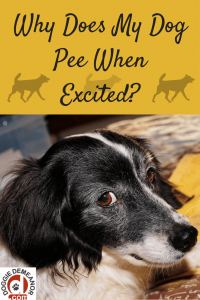 I’ve heard the question asked multiple times now, “Why does my dog pee when excited?” It can be puzzling, and frustrating, to see your fully housetrained dog tinkling indoors, and I can relate, it happened with my dog!
I’ve heard the question asked multiple times now, “Why does my dog pee when excited?” It can be puzzling, and frustrating, to see your fully housetrained dog tinkling indoors, and I can relate, it happened with my dog!
When you find that your fully housebroken dog or puppy tends to release a bit or urine, but just in certain situations, there may be one of two things going on.
- He is peeing out of excitement, or
- He is peeing to display submission
(Medical issues should always be taken into consideration as well, since things like bladder infections can cause urine leakage.)
Excitement Urination
This was the issue with my dog when he was still a puppy, yet fully housetrained. Whenever we arrived home, he would greet us with his excited wriggling body, wagging tail, and whoops…a bit of tinkle too.
Excitement urination usually occurs in puppies, and they almost always grow out of it by the time they reach about 1 year of age, if not sooner. Even so, it’s best to take steps to eliminate the behavior as soon as possible so you can get on with a life free of puppy puddles!
The best thing you can do is avoid overexciting your dog in situations where he is most likely to have an accident. For example, my dog used to pee whenever we would greet him after arriving home. This is very common with excitement urination since dogs will display excessive excitement upon seeing their owners after being left alone for a period of time.
To prevent excitement urination during a greeting, avoid walking directly toward your dog, or greeting him with an excited tone of voice. Instead, keep everything low-key by avoiding eye contact, using a soft, gentle tone (or don’t talk at all), and approaching your dog in a sideways crouch vs head on and standing above him.
If the problem persists you can try no greeting at all, until you see that he is in a calm state. It may be hard to ignore your excited pup, but don’t worry dogs don’t take things personal, so it is fine to do. In addition to no greeting, be sure to let your dog outside first thing when you arrive home. Then, once your dog has been let out, and you can clearly see that his demeanor is calm, you can give him a proper hello, keeping it low-key of course.
Always be mindful to be calm and gentle, and over time, your dog’s tinkling issue should diminish. Whatever method works best for you, be sure to tell your guests to do the same, and if it means telling them to completely ignore your dog, then so be it!
Another common situation where excitement urination occurs is when a dog is engaged in play. As you can imagine, playtime is an exciting time for a dog. When playing with your dog, make sure it’s not an aggressive type of play, and you’re not making movements in such a way that could scare or excite a pup much smaller than yourself! You should also be aware of the tone of your voice, being careful not to rile him up unnecessarily, or voice too much excitement. You can also help by taking a break or two so your dog doesn’t get overly worked up all at once. When possible, take the play outdoors so you can be worry free of accidents occurring in the house.
It’s important to remember that your dog is not being naughty and excitement urination is never an instance where a dog should be scolded in any way. In fact, scolding a dog for peeing when he is overly excited could create confusion and fear, and would most likely prolong, or make excitement urination worse.
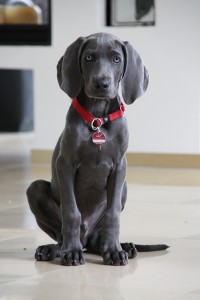 Submissive Urination
Submissive Urination
Submissive urination usually pertains to a dog that is timid, shy, fearful or anxious, and oftentimes will occur when they are scolded, nervous, or punished in any kind of way. They can also develop or continue submissive urination if they have a history of being punished for the act. The thing to remember here is that a dog with this behavior is not doing it on purpose, it is a response that occurs in situations where a dog feels intimidated, and they will never get over it if consistently punished for doing it.
To help your dog along, you will need to get him to trust you as being a strong leader. This way when he is with you he will instinctively know that you would never place him in a situation where he should be anxious, nervous or fearful. This is a good thing, because it will help him build confidence and eliminate the timid, nervous, or fearful feelings he possesses. If you lead him in a confident manner, then he will follow.
Number one rule…be patient, and very, very calm around your dog. A nurturing and supportive environment will be needed in order to guide your dog into a well-balanced state of mind. But, never feel sorry for your dog either, since this is an emotion easily sensed by dogs, and will quickly be perceived as weak leadership on your part.
If your dog is peeing when you arrive home, or when guests come over, be sure to keep all greetings low-key and slow. Your demeanor should be calm and portrayed as such in your voice, and your actions. Don’t appear overpowering to your dog in any way. Always speak in low tones, don’t show excitement, don’t stare in your dog’s eyes or stand directly over your dog, and consider not greeting him at all until you are sure he is feeling calm and comfortable.
A dog’s confidence can be built up through exposing him to new experiences, places and people, but for a nervous dog, this should be done slowly, and only when you feel your dog is ready for it. Taking walks with your dog to explore new sights and smells can be a great way to build his confidence, develop trust, and nurture the human to dog bond.
There are many different situations where dogs display submissive urination, and though some situations may seem minor and silly to you, they are very real to your dog. When these situations arise you need to create an atmosphere that feels non-threatening and relaxed. You can do this by always remaining calm and confident, never angry, frustrated or tense.
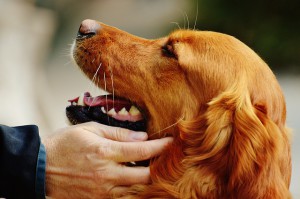 Tips and Reminders
Tips and Reminders
- Stay calm, always! If you should ever feel upset with your dog, don’t bestow your feelings upon him. Dogs are amazing at sensing our emotions, and setbacks in progress are often the cause of human emotions and reactions.
- No matter what, never scold your dog for excitement or submissive urination. But, you should never reassure your dog when the behavior occurs either as this will only reinforce the behavior and make him feel as though he is doing the right thing.
- When your dog does urinate in the house, do not show your frustration. You shouldn’t say anything to your dog about the accident, but do bring him outside immediately afterward in order to remind him that this is the place you want him to go.
- Remind yourself that getting frustrated, or giving up won’t change things, and your dog relies on your consistent support and leadership to help him over his hurdles.
- Don’t expect things to change overnight. Be patient, work diligently with your dog, and you will find that each day will bring about improvement.
Do you know a dog with excitement/submissive urination issues? If so, please share any comments, stories or tips.

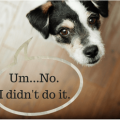

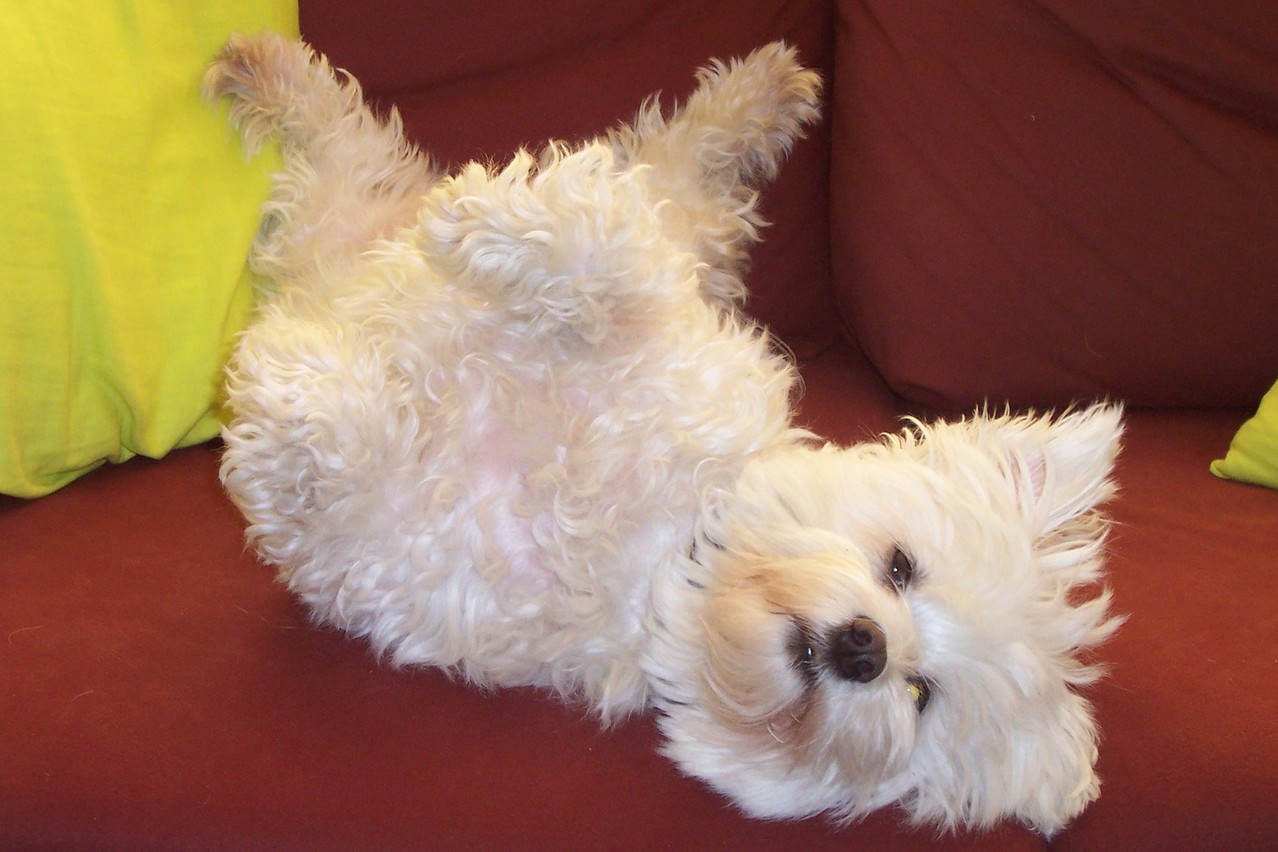
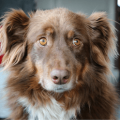

Hi,
My dog is in the second category. She suffers from submissive urinating but only in one situation.
We have a neighbor that owns a dog who is very dominant and can be aggressive. When both dogs were young we would let them play together and the neighbors dog became more and more aggressive with the playing.
Eventually the other dog snapped and attacked my dog. it was pretty violent and you could see that she was actually trying to kill my dog because she grabbed my dogs throat with her mouth and began to shake.
Fortunately I was standing right there and was able to pull the other dog off before there was any serious physical harm. But the emotional harm was already done in the case of my dog.
Now every time she sees the neighbor dog she immediately pees. I try to avoid contact with the neighbor dog the best I can but sometimes it’s hard.
Robert
Yikes, that’s a tough situation, and I sure hope your neighbor is taking a proactive approach in keeping the peace. Dog aggression isn’t always easy for the average person to change without the help of a knowledgeable dog trainer, so I hope they are working with one. Regardless, it is on your neighbor to ensure people and pets are safe when their dog is around. Exposing your dog to that type of aggression can be dangerous, so I would keep your dog away, just as you said you are doing. I would also suggest that if you happen upon the dog by accident, to stay calm since dogs are sensitive to what their human is feeling, and do your best to avoid, and teach your dog to do the same. Best of luck!
What a wonderful article you have hair about dog training I think all dogs get so excited when they see their masters come through the door some are just more hyper and excited and think nothing about holding their urine.
This is a Training process for both master and dogand I have to say you do give some great tips here of how to handle The situation. I know it’s my dog he cries and cries like a little baby when he knows somebody’s coming through the door so I will follow your tips and I will come back and visit your site more often thank you Angela
Yes, they sure do get excited when we come home, don’t they? It does wonders when we stay calm though, then they tend to follow suit. Thanks for stopping by!